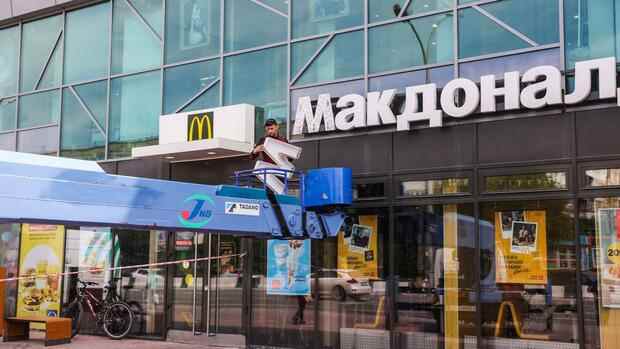A McDonald’s lettering on a branch in Novosibirsk is being dismantled – after more than three decades, the fast-food chain is withdrawing from Russia.
(Photo: IMAGO/ITAR-TASS)
Moscow Next Sunday, McDonald’s in Moscow will be history after more than three decades. On the so-called Day of Russia, the branch of the fast-food chain on Pushkin Square will be reopened under a new owner and with a new logo, precisely where the burger fryer, which is considered a symbol of US capitalism, started in Russia in 1990 .
Licensee Alexander Gowor announced plans to expand the chain to 1,000 locations across the country and to reopen all former McDonald’s restaurants under the new name within two months. Initially, he starts with 15 branches in and around Moscow.
The famous logo of the US burger chain also gets a successor: two fries and a burger patty in front of a green background. The new name is not yet known.
As a result of Russia’s invasion of Ukraine, McDonald’s sold its quick service restaurants to Govor last month. The group had previously decided to temporarily close its 847 restaurants in Russia because of the invasion. The US giant is preparing for a write-down of around 1.2 to 1.4 billion dollars in the course of the sale.
Top jobs of the day
Find the best jobs now and
be notified by email.
However, it remains to be seen whether the new brand will be as successful as McDonald’s before it. It takes decades to build a brand, said Peter Gabrielsson, Professor of International Marketing at Finland’s Vaasa University. “It’s important what the reaction will be and certainly people will make comparisons to McDonald’s.”
The logo is supposed to depict two fries and a burger patty.
McDonald’s was once considered a symbol of US capitalism in the former Soviet Union and opened its first branch there in 1990. More than 5000 people came to the burger premiere back then.
Numerous Western corporations withdrew from Russia after the attack on Ukraine and subsequent Western sanctions. The US burger roaster generated around nine percent or two billion dollars of its sales in Russia and Ukraine last year.
More: Why German companies can’t just withdraw from Russia
